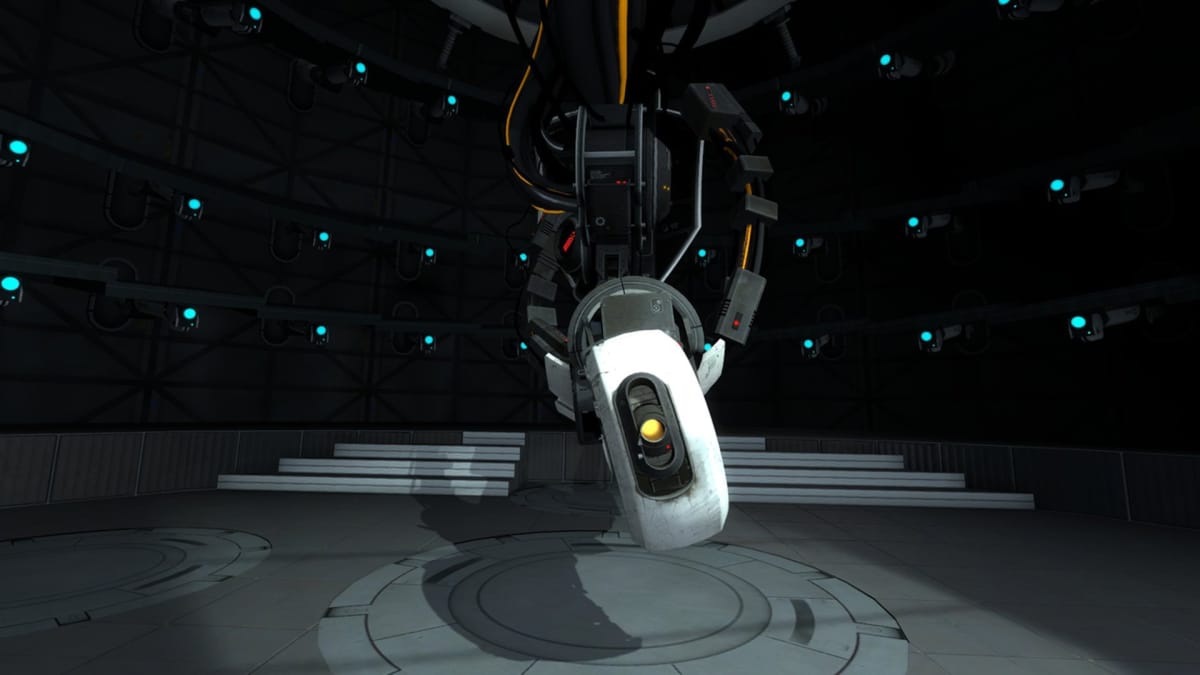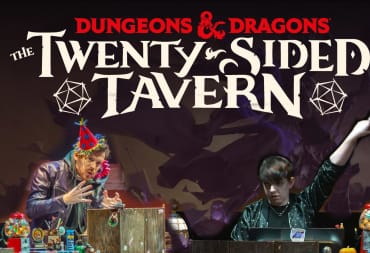Machines are almost always a major enemy in games. Alien to human beings, these automatons can be as ruthless and sadistic as any madman in existence but twice as horrific because of this aura of cold, emotionless distance they have. After all, a murderous machine would feel nothing when they kill you, right?
Well, not always. At least, Valve has shown that even a machine can have a personality, even if it can be deemed clinically psychotic. The Portal series, which began life as a small puzzle game spawned out of The Orange Box compilation, has blossomed into its own franchise now, and much of the acclaim has been laid out on two things within the game why. The first is the excellent puzzle gameplay, but the second is the characterization of the robot entity known as GLaDOS.
Ah yes, the maniacal, condescending GLaDOS stole the show in Portal because of the well-crafted witticisms that Valve was able to implement into the title. Portal and its well-received sequel, Portal 2, are great examples of well-made black comedies in the gaming world, filled with funny yet often unsettling dialogue that gives even the lowliest of non-human characters emotional gravitas.
In the center of this universe is GLaDOS herself, an amoral artificial intelligence that is able to convey a sense of superiority without directly stating it.
GLaDOS, according to the lore of Aperture Science, possibly stands for “Generic Lifeform and Disk Operating System.” First conceived in the 1980s by Aperture CEO Cave Johnson, GLaDOS was an attempt by Aperture Science to create a technological marvel that would rival their main competitors, Black Mesa, along with the Portal Project, which was being conceived in tandem.
Unfortunately, GLaDOS always had very maniacal tendencies, attempting to kill the scientists every time she was turned on. This led to the scientists attempting to add personality cores into her system to alter her murderous tendencies, with little effect. Eventually, GLaDOS was able to trick the scientists to give her some neurotoxin so she could study “true consciousness in the name of science.” Instead, she gassed the entire Aperture facility, killing all but one of the employees.
It is textbook mad science done in a tongue-in-cheek way. The very notion of scientists trying to solve why GLaDOS is a murdering robot is absurd as a concept, let alone the insanity of granting GLaDOS access to dangerous materials because of her past transgressions. This sets the tone for the player in the world of Portal; it is one that is deliberately off-kilter from the get-go, where science is taken to its most destructive conclusion from the onset.
GLaDOS would go on performing her “tests” on live subjects, essentially doing what she can to verbally and even physically demoralize and mangle her charges. GLaDOS is very condescending towards the player in a passive-aggressive way; her remarks are laced with a rather dry, elitist slant that attempts to psychologically undermine the confidence any test subject may have. This style is both manipulative and vicious, playing a game of cat and mouse with the subjects without them even knowing they are in a trap.
Eventually, the test subject known as Chell was released into the Aperture facility and was successful in defeating GLaDOS despite many attempts on her life. Chell sadly doesn’t escape the facility, nearly killed by the neurotoxin GLaDOS possessed, while GLaDOS lost her primary memory cores thanks to Chell’s ingenious use of the portal gun against her.
Unfortunately, GLaDOS also survived, as the final scene in Portal shows the remainder of her backup personality cores reawakening, as she vibrantly sings that she is “Still Alive.”
Portal 2, however, is where GLaDOS really shines. She does, for most of game, still attempt to murder Chell, especially now that she was defeated and nearly destroyed by her, but thanks to the bumbling misadventures of Wheatley the personality core, she is removed from power in the mainframe of the Aperture Science building and placed into a potato battery, not before seeing Wheatley go mad with power and turn on Chell in the blink of an eye. For a majority of the game Chell and GLaDOS form an uneasy truce to stop Wheatley from destroying the entire complex.
It seems that becoming a potato battery humbles GLaDOS a bit, at least, in terms of her own growth. Despite being a very distant, elitist being, GLaDOS did show regret in herself as the history of Aperture Science began to unravel, as we hear the various recordings of founder Cave Johnson and see the interaction with his assistant Caroline.
Through this we learn that Johnson, the terminally ill CEO of Aperture, wished to have the personality of his assistant put into the mainframe of the complex, effectively implying that GLaDOS is Caroline, or at least was at some point.
It causes GLaDOS to pause for thought regarding her own origins. While it is never stated for sure in-game, many signs imply that GLaDOS was Caroline at one point, before being transformed into the machine she is today. If true, this would make her somewhat sadistic tendencies more personal and downright sinister, as a form of revenge for her own Frankenstein-esque transformation.
At the same time, it makes GLaDOS more sympathetic and less alien to the player; she is no longer just a crazed machine, but rather is an exercise of the cartoonish, brute force nature of science gone awry, the perennial theme of the Portal games in a nutshell.
If this is the case, this does make GLaDOS a literal ghost inside of a machine, a human mind entrapped in mechanical thinking. A popular trope in science fiction stories is always the nature of what makes an A.I full of life. Many forms of media have explored this possibility, from the stories of Asimov’s I, Robot, to the cunning plots of Hal 9000 in 2001: A Space Odyssey.
The video game world has had its own exploration of this theme; as previously mentioned, SHODAN of System Shock fame is a notable example because of how similar her design motif is to GLaDOS as a sort of “omnipresent” force. The Mass Effect trilogy also explores the idea of synthetic life in a number of ways, the theme becoming a primary, recurring trope in the plot of the trilogy, even having its own homage to SHODAN in the Overlord DLC for Mass Effect 2.
In those cases, the pathos is lacking compared to GLaDOS somewhat. With the exception of Mass Effect, the themes of a lot of these killer machines is one of pure logical destruction or simple megalomania. The machines kill because it will save many more in the future or make the world one they can control. GLaDOS is a bit different; her mandate is to science, not the preservation of life, and her entire purpose is to further the egotistical pursuits of Aperture Science. She is shackled to her duty, but does so with unhinged enthusiasm to the point where it becomes unsettling.
If she was once a human, once the consciousness of Caroline, the question then becomes what actually changed her? It is easy to say revenge as the primary motivation, but if that was the case GLaDOS fulfilled her revenge by gassing the scientists. The only other possible explanation is the Aperture mainframe itself, which acts as a sort of drug that forces the connected computer to complete scientific tasks to achieve a euphoric feeling that is called “the itch” by Wheatley.
While it presents a Pavlovian compulsion to conduct experiments, this, mixed with the somewhat dark origins of GLaDOS, would likely warp her personality into one that is both diabolical and cynical, creating the personality we see in the Portal series. It may simply be a case where GLaDOS is forced to enjoy her mandate on science and becomes jaded by the cold calculations of the mandate psychologically, leaving her to enact joy at the expense of others - a homicidal sense of schadenfreude.
Regardless of her probable origins, GLaDOS begins to develop a begrudging respect for Chell, something that would be emphasized in the game's climax against the now dangerous Wheatley. In a desperate (and comical) move, Chell is able to send a portal to the moon that forces Wheatley to float in the vast reaches of space.
Chell herself almost went with him, but at the last minute was saved by GLaDOS, who proceeds to thank her for reminding her of Caroline again … before claiming to delete her memory and revert back to her more psychotic thought process. Instead of killing Chell, she decides, very begrudgingly, to let her escape the facility once and for all, showing her the way out, all the while singing her farewell with a disturbing army of automated turrets as her chorus.
There has been rampant speculation as to whether or not Caroline’s memory has been deleted by GLaDOS, with many believing that she didn’t in the end, choosing to keep her memory around. This is mostly implied on the game’s end song, titled “Want you Gone.” The song does state how she wishes to just remove Chell out of the picture, but also hints at mixed emotions about the whole ordeal, growing respect for Chell because of her actions and the memories spurred by her. Also, the fact that one of her lines “Now little Caroline is in her too” has sparked the idea that Caroline’s personality is not destroyed. If this is the case, and if Portal does come back with a new title, it may see GLaDOS undergo another transformation, or at the very least show more complex emotions away from her snarky, passive-aggressive attitude.
Whatever the case may be, GLaDOS proves to be more than just a killer machine. Her hilarious, comedic timing gave her a presence that was both funny yet sinister, and her growing personality has shown there is great depth underneath her programming. What makes her compelling is how much depth that can be explored, especially considering the implications of GLaDOS’ past. This alone makes her a worthy character study, but, of course, what really makes her famous is this.
This post was originally published in 2016 as a part of our Character Select series. It's been republished to have better formatting.
Have a tip, or want to point out something we missed? Leave a Comment or e-mail us at tips@techraptor.net












